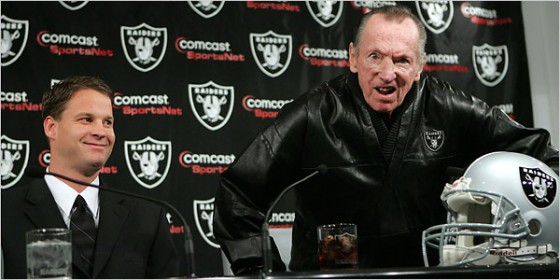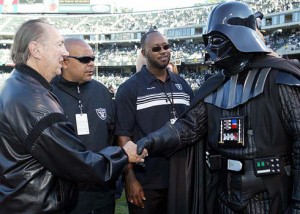Al Davis: No Apologies

To anyone familiar with his career it seems fitting that Raiders Owner Al Davis would die on Yom Kippur. It’s the Day of Atonement, when Jews are supposed to ask forgiveness for wrongs they have done to others and offer forgiveness for those that wronged them. Forgiveness was never Al’s style, as he did what he wanted regardless of who it would offend. Lessons learned working his way from an assistant college coach to the head coach of the Raiders were reflected in the ruthless way he approached his job as Owner and General Manager.

Over the course of his life Davis managed to offend fellow owners, commissioners, his own coaches, other teams’ coaches, the city of Oakland, the city of Los Angeles, current players, former players, his business partners and we have to assume most of the people he ever met. It was easy to forget over the last decade, as the Raiders faltered on the field and Davis’ health declined that he was once the most formidable man in the NFL and not merely a punchline.

While there has been a rush to canonize Davis for all the good he did as an owner, including the hiring of the first hispanic and black head coaches in the league along with the first female general manager, we shouldn’t forget all the things he did that offended, outraged or just general insulted people. While praised by some of the great names in the league (he introduced nine different Hall of Fame inductions) Davis also is hated for many of his moves, not that he minded.

With that in mind, we present a list of some of the boldest and most controversial moves of Al Davis’ career, and their results.
Hired as AFL commissioner in 1966, Davis immediately broke an informal truce with the dominant NFL, signing a number of high profile players to expensive contracts.
- This was the first direct assault by the upstart league and eventually led to the 1970 merger. Al of course had no interest in merging and resigned the commissioner’s job after only a few months running the league.
In 1972, Davis maneuvered to turn his minority ownership stake into a controlling interest in the team, drafting a new agreement that made him the managing partner.
- This move led to a lawsuit from his now deposed partner, the first of many times that Davis would find himself in a courtroom.
In 1980 Davis traded QB Ken Stabler (who had spent 12 years with Oakland) to Houston for daring to try to renegotiate his contract.
- While the player he received back, QB Dan Pastorini, did nothing for the Raiders, Oakland still managed to ride backup QB Jim Plunkett to victories in Super Bowl XV and XVIII.
- Stabler never won another playoff game in his career
 Also in 1980, Davis sued the NFL and commissioner Pete Rozelle for anti-trust violations for refusing to let him move the team from Oakland to L.A.
Also in 1980, Davis sued the NFL and commissioner Pete Rozelle for anti-trust violations for refusing to let him move the team from Oakland to L.A.
- Davis prevailed in Federal court, moving the team to Los Angeles in time for the start of the 1982 season. This was the first significant franchise in the NFL since the Chicago Cardinals moved to St. Louis in 1960.
- This opened the door for franchise relocation, including the Colts leaving Baltimore for Indianapolis and the Cardinals moving to Arizona.
Davis ordered the benching of future Hall of Fame RB Marcus Allen following a 1989 holdout.
- After averaging over 200 carries a season his first seven years with the Raiders, Allen only topped 70 carries once in his last four years.
- Allen moved to division rival Kansas City in 1993, where he returned to his Pro Bowl form.
In 1989 Davis fired second year Head Coach Mike Shanahan with a career record of 8-12
- Following a few years with market rival San Francisco as a coordinator, Shanahan jumped at the opportunity to take over fellow AFC West team Denver.
- Fueled in no small part by a dispute over unpaid salary Shanahan delighted in beating the Raiders, often keeping his starters to run up the score. Shanahan won two Super Bowls and had a 21-7 record against Oakland during his tenure in Denver.
In 1995 Al had enough of Los Angeles refusing to upgrade his stadium and moved the team back to Oakland
- Another lawsuit against the NFL resulted, though this one was eventually decided against the Raiders.
- Davis also sued the NFL for television rights to L.A. after the team was moved back to Oakland, this suit was another loss for the Raiders.
Unwilling to give Head Coach Jon Gruden the large contract extension he wanted after the 2001 season Davis traded his coach to Tampa Bay for four high draft picks and $8 Million in cash.
- Gruden coached the Bucs to the 2002 Super Bowl, where they defeated the Raiders convincingly, 48-21.
- The Raiders have not had a stable head coach since Gruden left.
- The four players picked combined to appear in no Pro Bowls.
 Following a 1999 season in which the Raiders lost a number of close games Davis shocked the NFL by drafting troubled placekicker, Sebastion Janikowski, with the 17th overall pick in the 2ooo draft.
Following a 1999 season in which the Raiders lost a number of close games Davis shocked the NFL by drafting troubled placekicker, Sebastion Janikowski, with the 17th overall pick in the 2ooo draft.
- Janikowski has gone on to become the Raiders all time leading scorer and the one constant in Al’s last decade of ownership.
Following the 2007 season Davis hired 31 year old Lane Kiffin as his new coach. Kiffin had been the Offensive Coordinator at USC for only two seasons prior to his hiring in Oakland.
- Davis reportedly tried to force Kiffin out after only one season, pressuring him to resign following a 4-12 record in his first season. Kiffin refused, as he knew Al was trying to avoid paying off his contract.
- After a 1-3 start to the 2008 season Kiffin was finally fired. In a bizarre press conference the Raiders accused him of dishonesty and disloyalty and announced that he would not be paid for his remaining contract. A letter stating this was also sent to Kiffin’s next employer, the University of Tennessee
- Kiffin sued the Raiders, and Davis, for breach of contract, but lost as the court found that Davis had enough cause to dismiss him.
- Davis received some vindication when Kiffin left UT for USC after only one season, leaving the school in turmoil and under NCAA investigation.










